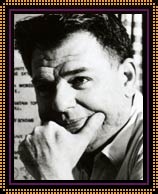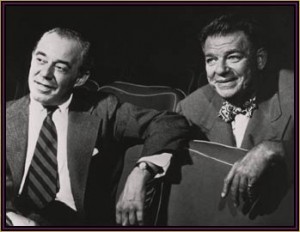 Oscar Clendenning Hammerstein II (1895-1960) was perhaps the most influential lyricist and librettist of the American theater. Major musicals for which he wrote the lyrics include “Show Boat,” “South Pacific,” “The King and I,” and “The Sound of Music.”
Oscar Clendenning Hammerstein II (1895-1960) was perhaps the most influential lyricist and librettist of the American theater. Major musicals for which he wrote the lyrics include “Show Boat,” “South Pacific,” “The King and I,” and “The Sound of Music.”
Oscar Clendenning Hammerstein II was born into a great theatrical family on July 12, 1895, in New York City. His grandfather, Oscar I, was an opera impressario and showman. His father, William, was the manager of Hammerstein’s Victoria, one of the most famous vaudeville theaters of its day. His uncle, Arthur, was a well known producer. All were famous in their own right, but all would be eclipsed by the success of Oscar II, the third generation theater Hammerstein. Oscar, or “Ockie” (his lifelong nickname), dabbled in theatrical activities as a youth, but when it came time for a career choice his father pushed him away from the theater. Oscar went to Columbia University in preparation for a career in law. It was at Columbia, however, that Oscar’s career in theater actually began when, at age 19, he joined the Columbia University Players as a performer in the 1915 Varsity review “On Your Way.” He participated heavily in the Varsity shows for several years, first as a performer and later as a writer. It was at Columbia that Oscar first met the young man who would later collaborate with him and with Lorenz Hart, another Columbia alumnus: Richard Rodgers.
Oscar Hammerstein II
- "Allegro"
- "Carmen Jones"
- "Carousel"
- "The Desert Song"
- "Flower Drum Song"
- "The King and I"
- "Me and Juliet"
- "The New Moon"
- "Oklahoma!"
- "Rose-Marie"
- "Show Boat"
- "The Sound of Music"
- "South Pacific"
- "State Fair"
- George Abbott
- Julie Andrews
- Agnes de Mille
- Alfred Drake
- Jerome Kern
- Joshua Logan
- Mary Martin
- John Raitt
- Jerome Robbins
- Richard Rodgers
- Stephen Sondheim
In 1929 Oscar divorced his wife of 12 years, Myra Finn, and married Dorothy Blanchard Jacobson. The next decade turned out to be a happy one for Oscar personally, but unhappy professionally. He spent much of his time in Hollywood, working on contract to various studios. He discovered that he did not work well under the rigorous time demands of the movie industry, having achieved his greatest success with “Show Boat”‘s one year writing period. In 1942 he returned to New York with Dorothy and began leisurely work on an adaptation of Bizet’s “Carmen.” Oscar adapted the lyrics and story to create the Americanized, all-black “Carmen Jones.” The opera received great acclaim.
When he had finished the libretto for “Carmen Jones,” Oscar was contacted by an old Columbia acquaintance, Richard Rodgers, whose partnership with Lorenz Hart had recently dissolved. Rodgers had read Lynn Riggs’ “Green Grow the Lilacs” and wanted to collaborate with Hammerstein on a musical adaptation for the Theatre Guild. Hammerstein had also read the play, and the two began work on the musical, tentatively titled “Away We Go!” Rodgers and Hammerstein worked toward the concept of the integrated musical, with Hammerstein writing most of the lyrics before Rodgers wrote the score, the reverse of the normal process. Robert Mamoulian was signed on as director, Agnes de Mille as choreographer, and Terry Helburn as producer for the Theatre Guild.
When the musical, retitled “Oklahoma!,” opened on Broadway on March 31, 1943, it was an enormous success, both critically and popularly. “Oklahoma!” ran for 2,212 performances in its initial Broadway engagement, and in 1944 it received a special Pulitzer Prize. The team of Rodgers and Hammerstein was a success. They produced their own work and promising works by other artists and at one time had five of the highest grossing shows running at the same time on Broadway. They followed up their success with collaborations on “Carousel” (1945), “Allegro” (1947), “South Pacific” (1949), “The King and I” (1951), “Me and Juliet” (1953), “Pipe Dream” (1955), “Flower Drum Song” (1958), and “The Sound of Music” (1959), for which Howard Lindsay and Russell Crouse wrote the book, Rodgers composed the score, and Hammerstein wrote the lyrics. “South Pacific” won the Pulitzer Prize in 1950. “South Pacific”, “The King and I,” and “The Sound of Music” all won Tony awards for best musical. Most of the Rodgers and Hammerstein musicals have been adapted for the screen, with the greatest success going to OKLAHOMA! and THE SOUND OF MUSIC.

Richard Rodgers and Oscar Hammerstein II.
Hammerstein’s talents as a lyricist and librettist are undeniable. Countless productions of Hammerstein musicals on Broadway, on tour, and in professional, amateur, and academic theaters around the world testify to the remarkable quality of his work. Hammerstein’s influence on the next generation of lyricists and librettists was also direct and observable. Most notable was his influence on Stephen Sondheim, lyricist for such shows as “West Side Story,” “Sweeney Todd,” and “Sunday in the Park with George.” Sondheim was a close friend of the Hammerstein family from childhood and attributed his success in theater directly to Hammerstein’s influence and guidance.
Oscar Clendenning Hammerstein II died in his home in Doylestown, Pennsylvania, on August 23, 1960, a victim of stomach cancer. He left behind three children, William and Alice by Myra Finn and James by Dorothy Blanchard Jacobson. On September 1, 1960, at 9 p.m., the lights were extinguished on Broadway in memory of Oscar Hammerstein II, the “man who owned Broadway.”
Source: Excerpted from ENCYCLOPEDIA OF WORLD BIOGRAPHY, 2ND ED. 17 VOLS., Gale Research, © 1998 Gale Research. Reprinted by permission of The Gale Group.
Photo credits: Photofest and the Rodgers & Hammerstein Organization

